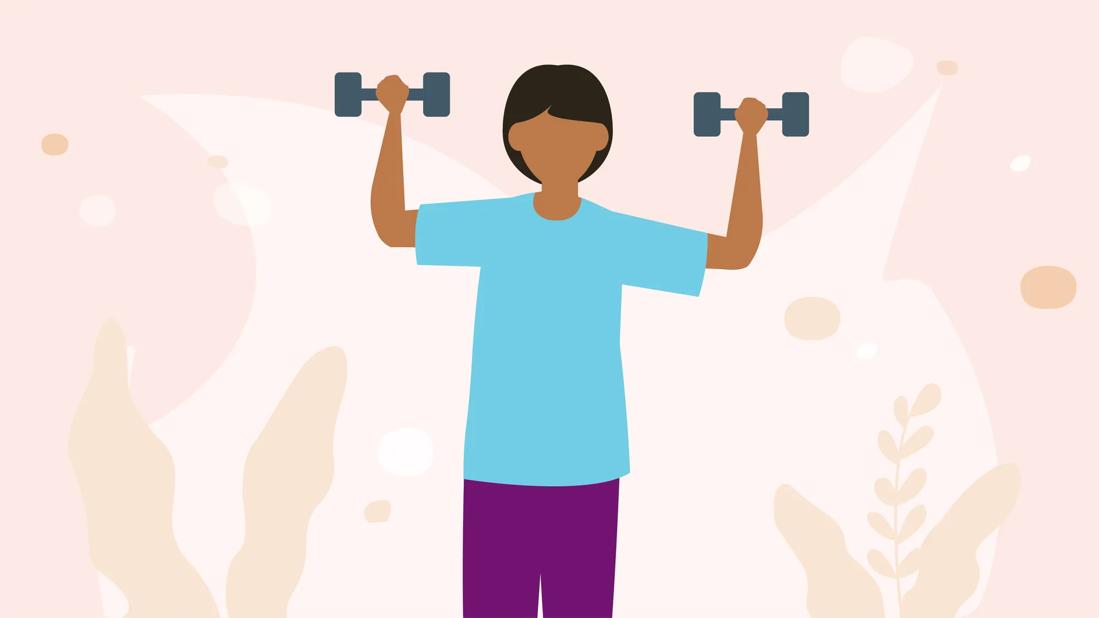Always seek medical advice for pain — but exercise, stretching, guided imagery and deep breathing may help in the meantime

Feeling pain is part of being human. But that doesn’t mean you have to like it. Or suck it up and live with it.
Advertisement
Cleveland Clinic is a non-profit academic medical center. Advertising on our site helps support our mission. We do not endorse non-Cleveland Clinic products or services. Policy
Whether it’s a nagging back injury that never quite healed right or that immediate make-you-want-to-cry-out-loud agony of a potential ankle break or sprain, we all know that pain is ... well, a real pain.
For some people, things like surgery, medication or cortisone injections do the trick. (Yay!) And being evaluated for medical pain relief options should always be the first step.
Alongside those treatments are a slew of natural pain relief options that can help you feel your best, too.
But what do they do? Are they safe? And are they actually effective?
We talked with wellness and preventive medicine pain management specialist Stephanie Whitling, PA, about options for nonmedicinal pain relief.
Natural pain relievers are remedies and practices that can help lessen the pain you experience through means other than conventional medicine, like pills, injections or surgeries.
The term “natural” can mean different things to different people. And some therapies that are described as “natural” aren’t your best options.
“Many people with various ailments, including pain, desire to treat them naturally,” adds wellness and preventive medicine specialist Robert Saper, MD, MPH. “But natural doesn’t always equal effective and safe. For example, some people recommend magnets or copper bracelets for pain. These are ‘natural’ but they’re not effective. For this reason, I always use terms like ‘evidence-based,’ ‘nondrug’ or ‘nonpharmacologic treatments.’”
Advertisement
In other words, the best natural pain relief options are ones that are also backed by science.
So, before we dive into the options, let’s back up for a moment and set some ground rules.
Pain should be taken seriously. And visiting a healthcare professional, like a primary care physician or a pain management specialist, to get expert advice on the cause of your pain and how to best manage it is critical.
“Just about anyone experiencing pain can benefit from natural, evidence-based pain relief,” Whitling states. “The goal is to lower inflammation in your body and release feel-good hormones that can lessen your perception of your pain.”
But not all pain remedies will necessarily address the root cause of your aches. And working to get to the source of the pain in other ways is important.
Pain is generally a sign that something is going wrong in your body. And you deserve to be taken care of with the most science-backed methods available.
What’s more, unmanaged pain can develop into a chronic problem. And pain that lingers can be harder to get under control.
Let’s look at seven ways to lessen your pain naturally.
Heat therapy and cold compresses are probably the most commonly used home remedies for pain. For good reason.
Heat can help to get stiff muscles moving. Ice can decrease inflammation.
So, brand-new injuries, like bruises and sprains, are typically better served with ice. And muscle or joint stiffness, like arthritis or a nagging hamstring injury, may benefit more from heat.
How do you know which is right for lessening your pains? Listen to your body.
“I’ll tell people that whichever makes them feel better is right for them,” Whitling advises.
Alternating heat and ice therapy can also help address your pain on both fronts.
Keep these safety tips in mind:
If you’re living with pain, exercising can sound downright miserable. If not impossible.
But getting healthy movement in your life can help you feel better.
“Too much sitting causes our muscles stiffen to up,” Whitling shares. “The more we can get up and move around, the better off we’re going to feel.”
What’s more: Exercise releases endorphins — pain-relieving hormones.
Advertisement
Don’t attempt exercises that make the pain worse. Leave that whole no-pain-no-gain thing to the professionals.
The goal of exercise for pain relief is to keep your pain from becoming even more troublesome. So, back off on movements that cause more pain. Until you’re cleared by a healthcare provider, keep it simple and pain-free.
Depending on where you hurt, you might try:
When our muscles are bunched up and angry, they hurt. Stretches can help lessen that pain.
Again, the goal isn’t to make it hurt more. It’s about gently lengthening your aching muscles. So, take it easy on yourself.
Your healthcare provider or a physical therapist can help you devise a plan that will work the specific areas of your body that are causing your pain.
But here are some ideas to get started:
Some nonpharmacological pain relief techniques center on helping your brain change your perception of pain. That’s not to say that your pain is in your head. Rather that your mind can get used to sending pain signals, long after they’re useful. And you can work to rewire those impulses.
Advertisement
“In a way, your brain can get kind of stuck feeling and expecting pain. But you can retrain your brain’s thought processes,” Whitling points out.
Guided imagery is one way to do that.
“Guided imagery is a way of mentally putting yourself somewhere else and using your senses to envision yourself in that place as fully as you can,” she explains.
So, pick a place you find calming, say the beach. Imagine yourself sitting on the sand. Feel the breeze. Smell the salt water. Hear the waves. Watch the seagulls circle above your head. (Can you picture it?)
Close your eyes and immerse yourself as fully as you can within that scene. Stay there for five minutes or as long as you can.
“When we do mind exercises like guided imagery, we’re rewriting the neurotransmitters — the messengers in our brain,” Whitling elaborates. “It’s telling your brain, No, we don’t need to focus on the pain. Let's focus on the beautiful seaside landscape. You take yourself out of your pain and into a new reality.”
And it’s not just about distracting yourself for a few minutes while you participate in the meditation. With practice, you’re giving your brain new things to think about. So, now it has something else to focus on rather than sending out a slew of pain warnings.
Advertisement
A variety of apps is available to help practice guided imagery, or a healthcare provider may be able to recommend a guided imagery practitioner.
When you’re living with pain, it affects more than just the area where you feel it. It can affect your whole body.
Pain can activate our fight-or-flight response. That can cause reactions like:
That’s the work of your sympathetic nervous system. And when it’s all wound up, you don’t feel your best.
You can train your body to step out of fight-or-flight and into a more restorative response (courtesy of your parasympathetic nervous system) with things like deep breathing.
“A lot of times when we have pain, we don’t breathe naturally, and then your muscles tense up even more,” Whitling explains. “When you breathe more deliberately, you help to get more oxygen to all parts of your body, which can help you relax and tamp down that stress response.”
Give these breathing techniques a try:
When people talk about “natural” pain relief, some of them go right to vitamin supplements and herbal remedies.
But just because those bottles are labeled with words like “natural pain relief,” that doesn’t mean they’re safe. Or that they’re going to do much of anything for you.
Whitling advises talking with a healthcare provider before taking any bottled remedies. The supplement market is highly unregulated, and the research on most of those products is limited at best.
Some providers may recommend things like magnesium or curcumin (turmeric). Both have been suggested to have potential pain-relieving properties. But they can also interact negatively with other medications. And the research on them to date isn’t necessarily of the highest quality. That said, magnesium deficiency is common. And Whitling says that she often sees people who benefit from magnesium supplements.
One packaged “natural remedy” that could provide some pain relief, without the risk, is Epsom salt.
Epsom salt is a naturally occurring mineral salt that contains high amounts of magnesium. The research on it is also limited, but it’s understood that the magnesium released in an Epsom salt bath can absorb through your skin and help relieve inflammation and pain.
The field of integrative and complementary medicine abounds with medical professionals who operate outside the realms of medication and surgery. Instead, they focus on healing techniques that work hand-in-hand with conventional medicine.
Depending on the reason for your pain and your overall needs, you may benefit from services like:
Pain is your body’s way of telling you that something is wrong. Listen to it. Talk with a healthcare provider. And feel better soon!
Learn more about our editorial process.
Advertisement

Your choice depends on your reason and need for treatment

Finding a neutral position can ease stress on your back, neck and shoulders

Five minutes of quiet, focused time can help

Know how long pain should reasonably last

Understanding your alternatives

Gallstones can block bile in your biliary system and lead to pain and discomfort

Science doesn’t support most claims about this bee byproduct, and supplements have potential risks

This chronic condition most commonly causes pelvic pain and severe cramping during periods, but it can bring other types of pain symptoms, too

The tropical fruit is a good source of antioxidants and vitamin C

Most people fall asleep within 10 to 20 minutes, but if your experience is different, adjusting your sleep schedule may help

Exploring your hidden side can lead to better understanding of what makes you tick